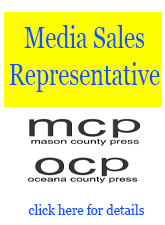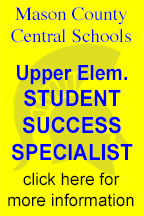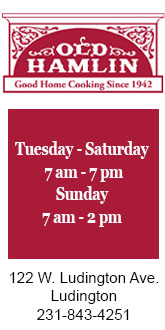 By Rob Alway, Editor-in-Chief.
By Rob Alway, Editor-in-Chief.
CUSTER — The Western Michigan Fair Association is considering proposals for operating the 2016 large animal auction. During a nearly four hour meeting, the fair board heard three proposals for the auction, which came as a result of the West Michigan Livestock Council failing to maintain its 501(c)3 non-profit status and its failure to file taxes over the past three years.
The board chose to table action on the proposals so its members could review them. It will likely hold a meeting within the next week.
The fair board voted at its January meeting that if the large animal council’s tax exempt status was reinstated by the August fair then it would likely allow it to hold the auction. The other choices would be to allow Mason County 4-H to take over the auction or for the fair board to operate it itself.
During Monday’s meeting, representatives of the West Michigan Livestock Council presented paperwork proving that the council was in the process of filing its reinstatement paperwork with the Internal Revenue Service, including three years of the required 990 forms, which are the annual tax statements non-profit corporations are required to file. The annual large animal auction raises over $200,000 annually.
Monday’s meeting agenda included “plan B” proposals for the large animal auction.
Three proposals were made to the board, from Mason County 4-H and two from fair board members.
“Our proposal is an extension of what we are already offering,” said Cynthia Corey of Michigan State University Extension. “Mason County 4-H already holds a small animal market sale prior to the large animal sale. Our proposal is an extension of what we are already offering. The small animal sale will be conducted first followed by the large animal sale.
“Processes already exist to make the transition occur smoothly. The auctions already share buyer numbers, a dinner is offered for buyers and the West Shore Bank clerks the auction. Superintendents from each species will support and assist youth in lining up for the sale to keep it operating smoothly. The potential order of the sale will be small animals: rabbit, chickens, goats, young beef and then large animal: beef, dairy, lambs and swine.
“This order is open for auction committee discussion and may rotate from year to year. The Mason County 4-H Program proposal requests only 3 percent commission from each sale lot to help cover the cost of conducting the auction. Funds will be held in an auction account to assist in covering costs in future years and to support auction promotion efforts. The auction committee, in cooperation with Mason County MSU Extension office, will advertise for the sale, send buyer letters, send passes, organize buyer recognition, and prepare the sale bill.
“The Mason County 4-H Program will run an efficient and successful livestock auction for all buyers and 4-H animal exhibitors that exemplify our programs mission, philosophy and guiding principles.”
Fair board member Rebecca Berringer presented a proposal on behalf of the fair board:
“WMFA market committee will be inclusive, bringing more youth/agriculture related entities into the fair program.”
Berringer said the fair board association’s proposal would mean the fair board would operate all the animal auctions.
“The WMFA market committee would be youth led providing for significant opportunities for youth to represent the organizations that they belong to, as well as gain a greater understanding of the operation and responsibilities of fair.
“WMFA Market Committee structure would allow youth to focus on education which would enhance their fair experience.
“WMFA would be working with organizations such as 4-H and (Future Farmers of America), helping to ensure that education becomes the focal point for youth market projects.
“WMFA would oversee all financials related to the sale, ensuring that all required forms and documents are filled.
“By bringing more agriculture related organizations to the table, WMFA would be fulfilling their mission statement by enhancing their promotion of agriculture and creating a sense of kindred spirits among the many organizations that serve the youth in our county as well as the agricultural businesses and families.”
The fair association would assess a 5% fee to all market sale exhibitors. From the fee, the fair board would create a scholarship endowment fund.
“This is just a starting proposal,” Berringer said.
Fair board president Mike Stakenas offered yet another proposal, basically allowing the West Michigan Livestock Council to continue operating the auction with increased partnership with the fair association.
“I basically see it the fair association would partner with the WMLSC,” Stakenas said. “This proposal is essentially allowing the livestock council to operate as a sub-entity of our association.”
Stakenas said the fair board would use its 501(c)3 status.















































.png)

